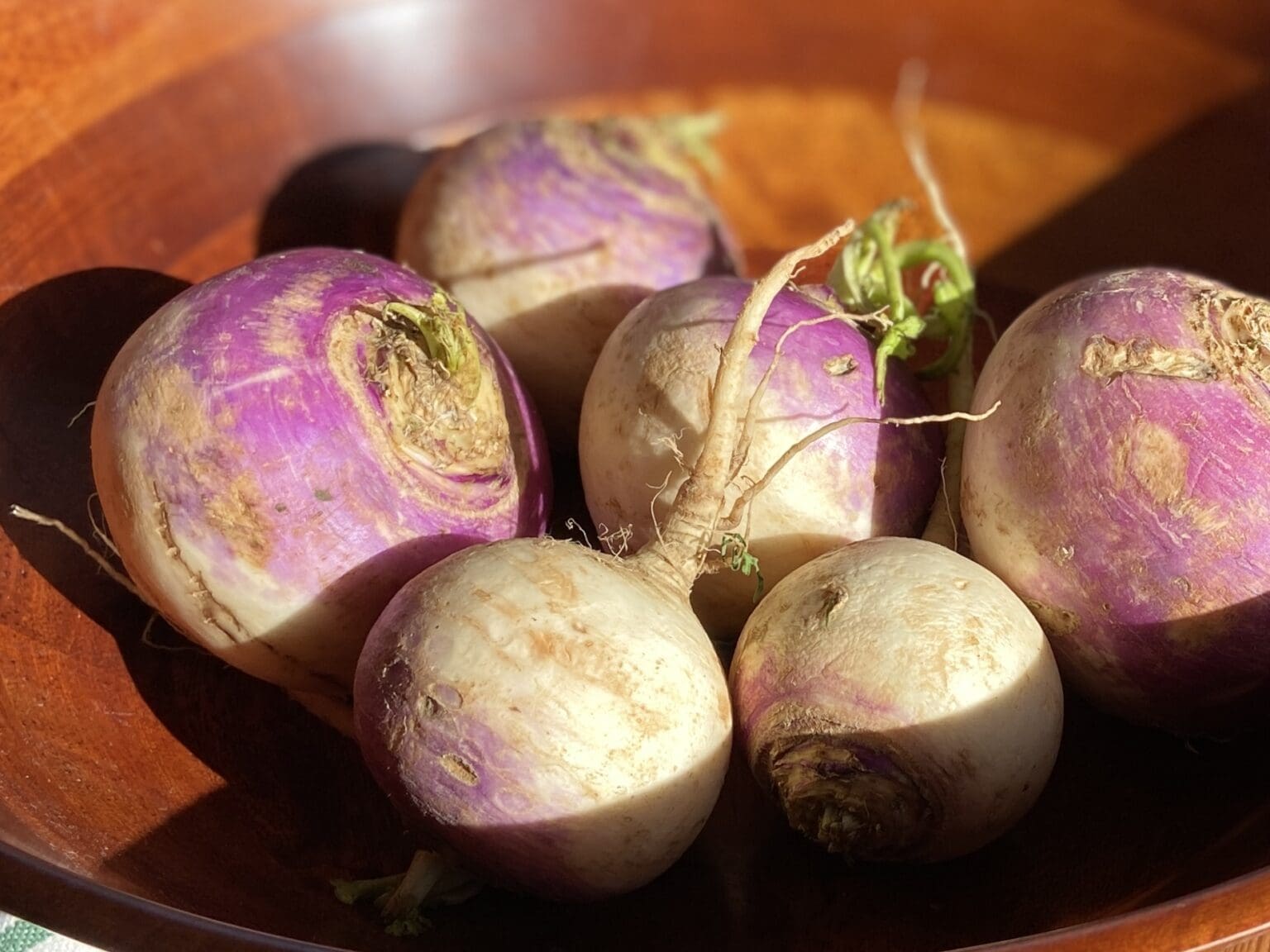Happy New Year! In keeping with the spirit of the holiday, this month we’re making turnip greens, a traditional New Year’s dish served in many households. Turnips with greens are an excellent example of root-to-leaf cooking, which uses all edible parts of the plant. No need to even peel the turnips; this preparation will soften even tough turnip skins.
This recipe is based off my family recipe for collard greens. “Recipe” might be a strong word — for starters, this is a very common way to prepare greens, though every household kitchen has its secret ingredient or hill-to-die-on preference.
For another, many of the recipes my family has loved for generations are more like signposts that direct you to your destination, but don’t track every step of the way. (My great-grandmother wrote down her recipe for homemade bread, and one of the steps is “knead it til it feels right.”)
I asked my parents how they cooked greens when I was growing up. Being from South Carolina and Tennessee, respectively, they cooked greens most often for Sunday dinners. The instruction I got from them was a “knead it til it feels right” kind of recipe. But here I’ve measured the ingredients as I added and adjusted them to get us as close as possible to the greens that have stewed in my parents’ and grandparents’ pots.
Traditionally, ham bone or ham hocks are used (in previous generations, most likely from their own farm), but here I use bacon, which is what I had on hand. “Use what you have” is another excellent intergenerational note of wisdom.
Slow-cooked turnips and greens
Ingredients
1 pound turnips, scrubbed well
1/2 pound turnip greens, washed thoroughly in cold water
6 ounces bacon
1 to 1/2 cup broth or water (I used chicken broth)
1 teaspoon white vinegar, or to taste
Dash of pepper vinegar or Tabasco sauce (optional)
Directions
Heat a large Dutch oven or pot to medium. Slice the bacon into 1-inch pieces and add to the pot. Cook until the fat has rendered and the bacon is cooked to your liking. I like mine a little chewier in greens, but feel free to crisp it if you prefer.
While the bacon cooks, dice turnips into 1/2 in pieces and roughly chop the greens.
Once bacon has rendered, add the chopped turnips and greens to the pot and stir thoroughly to coat the greens.
Add chicken stock or water to the pot. Put the lid on and simmer the turnips and greens on low for 45 minutes to 1 hour. Check the greens every so often; if they start to stick to the bottom or sides of the pot at all, add a little more broth or water, about 1/4 cup at a time.
This may seem like a long cooking time. This is intentional; a long, slow cook time results in silky-soft and lightly sweet turnips, and gives the greens time to infuse with the broth and bacon for a deeper flavor. This is also a very forgiving recipe; if the greens aren’t sticking to the pot and the turnips aren’t browning, you can keep the pot simmering on the stove for however long it takes to make the rest of a meal and still serve the greens warm.
Cook until the turnips and greens are meltingly tender. Right before you take the turnips off the stove, add vinegar to taste, starting with 1 teaspoon. Pepper vinegar is a Southern staple, but can be hard to find; I used white vinegar. Add red pepper flakes or Tabasco sauce if you like, and serve.
Notes
If your turnip greens come to more than 1/2 pound, add another 1/2 cup water to the initial cook time. If you can’t find turnips with their greens still attached, use escarole, mustard greens or collards and follow the recipe as written.
Instead of chicken broth, feel free to substitute vegetable broth or simply plain water. If using water, add a little salt to taste when you add the greens. Remember that the broth, which often has added salt, will be flavored with bacon, which is also salty. The liquid will reduce a little during cooking, which will only concentrate its flavor. If in doubt, use water in place of half the broth, and if you need to add more liquid to the pot, you may want to use water.
Use ham hock or smoked turkey instead of bacon or omit entirely for a vegetarian dish. If omitting the bacon, melt 2 to 3 tablespoons of butter in the pot instead of browning the bacon and proceed with the recipe as written.
Serve with black-eyed peas and cornbread, add beans to make a stew, or serve as a side dish to chicken or pork.
Hannah Green’s Root-to-Leaf column runs the first week of every month.




